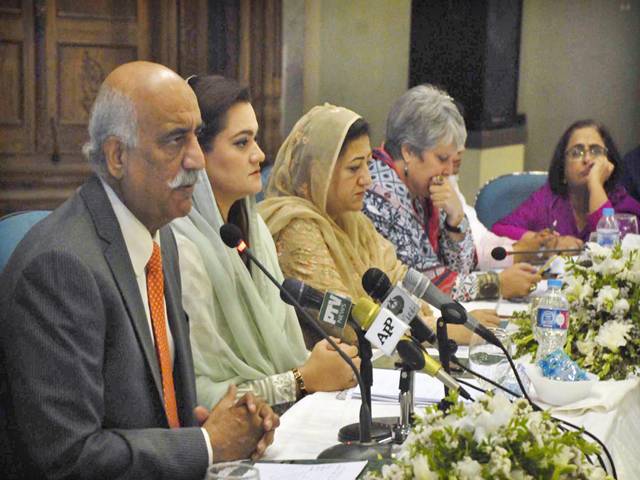ISLAMABAD - Opposition Leader in the National Assembly Khurshid Shah Thursday said the whole nation needed to get united against the extremist mindset.
Addressing a round table conference on ‘Culture of Tolerance: Reviving the Indigenous Narrative’ organised by the National Institute of Cultural Studies here, Shah said media has to play a proactive role to defeat the menace of terrorism. “We all have to work together to end intolerance from the society and promotion of tolerance,” he said.
He said the extremist mindset had to be eliminated for a peaceful society. He said racism was another evil which had promoted intolerance in the society. He said before 1977 Pakistan used to be a tolerant society where all lived in harmony.
Shah urged the media to discuss real national issues like economy, environment and water scarcity in the prime time shows. “We have to work for tolerance in politics,” he added.
The Pakistan People’s Party leader said the dictatorial rules had given rise to the intolerance. He said smooth sailing of democracy was a must to defeat the terrorist mindset.
Addressing the conference, former lawmaker Bushra Gohar said the murder of Mishal Khan in Mardan University had exposed how the nation was falling into narrow mindedness.
She said some elements were trying to malign Nobel laureate Malala Yousufzai for their own reasons.
Member National Assembly Aasia Nasir said Pakistan was a peaceful society but due to certain reasons it was radicalised and incidents like Kot Radha Kishen, Gojra and Mardan University had become common.
She said Quaid-e-Azam Muhammad Ali Jinnah's speech in the constituent assembly on August 11, 1947 and his 14 points were the real national narrative.
She called for revolutionary changes in the educational curriculum which was responsible for radicalisation of the society.
Pakistan Muslim League (Quaid-e-Azam) leader Saeed Mandokhail said media could help develop a tolerant society.
Chairperson of National Institute of Cultural Studies Rubina Khalid said all stakeholders should come forward and promote the real national narrative.
In her address on the occasion, Minister of State for Information, Broadcasting and National Heritage Marriyum Aurangzeb said that the narratives which enjoyed national consensus invariably proved successful.
She said that the national narrative reflected the aspirations of the people while the legislators represented the will of the people and whenever they were distanced from the national narrative, the country had to suffer.
She said that political parties, political leaders and workers had given great sacrifices for strengthening the democratic culture in the country. She said that the government in consultation with all the stakeholders was striving to revive the indigenous national narrative which was pushed back by the upsurge of terrorism and extremism in the 1980s, for which undemocratic rules in the country were also responsible to a great extent.
Marriyum recalled that in the 1950s to 1970s Pakistan used to be a peaceful society and the indigenous narrative that prevailed during that period immensely contributed to national unity and integration.
The minister appreciated the role and sacrifices rendered by the armed forces, law enforcement agencies and the general public in the war against terrorism. She said Pakistanis were a resilient nation which had fought and almost defeated terrorism with great courage.
She said that the operation Raddul Fasaad would help in changing the prevailing mindset, noting that various operations launched in different parts of the country to improve security situation had paid dividends.






